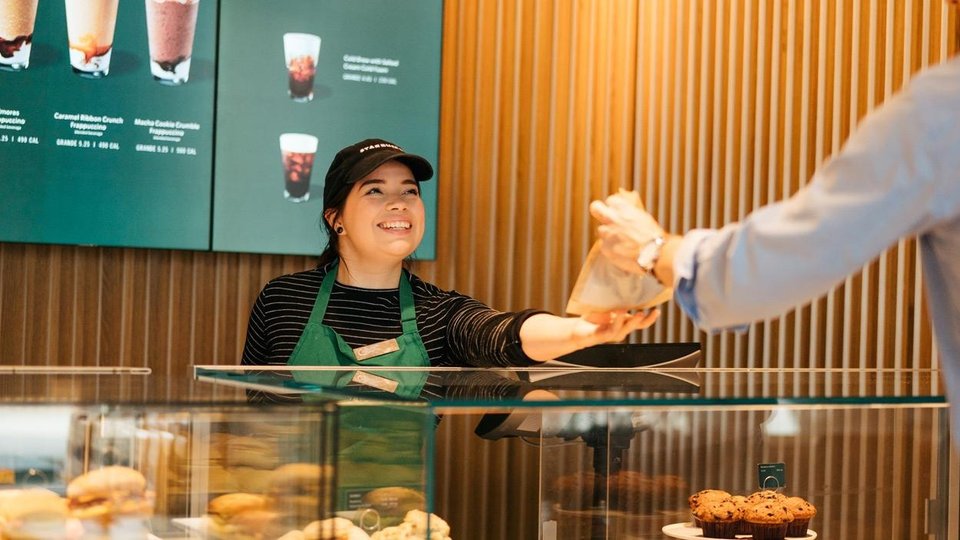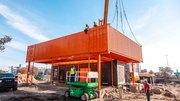Operations
Starbucks to have 55,000 stores by 2030

March 16, 2022
Shortly after Starbucks CEO Kevin Johnson announced his retirement Tuesday, he told shareholders during the brand's annual meeting the company would continue to be a trail blazer and confirmed plans to hit 55,000 stores in over 100 markets by 2030. It now has 34,000 locations.
The board has appointed founder and former CEO Howard Schultz as interim CEO effective April 4, when Johnson steps down, and the company stated it would continue to help employees, promising continued access to COVID-19 benefits for eligible partners, including:
- Catastrophe pay, extended childcare benefits, expanded mental health support, vaccine pay and food and beverage allowances, as well as partner benefits to help address needs in different parts of the world.
- Security of jobs and pay as well as investments in U.S. partner wages and experiences. In FY22 Q1, the company first shared the announcement of an incremental $1 billion in wages, training and benefits.
Starbucks also said it was dedicated to innovation and deployment of equipment, programs and technology to improve the store experience for employees. This includes:
- More efficient coffee brewing equipment such as the Mastrena II espresso machines and the new Starbucks Cold Brewer.
- Installing MerryChef ovens across thousands of stores.
- Deploying handheld ordering devices to stores.
- Launching Shift Marketplace, an app designed to make it easy for partners to switch and offer shifts virtually.
- Expanding Starbucks safety Lyft program to provide rides home for partners after dark.
"I'm so proud of all we've done these past two years and how our partners inspired the best ideas to lead us through the pandemic," Rossann Williams, president of Starbucks North America, said during the shareholder call. "We are just coming out of one of the most complex times of our lives, and I'm proud of how we figured it out together, in service of each other, our customers and our communities. And we are going to use this exact same approach as we build our future, the way only Starbucks can."
A 'people positive' company
Virginia Tenpenny, vice president, chief global social impact officer and board member of The Starbucks Foundation, said the company was committed to enhancing the well being of 1 billion people connected with the company by 2030.
For example, it has committed $30 million by 2030 to drive locally relevant impact in the communities where Starbucks operates and is promising to impact 1 million women and girls at origin by 2030.
"As we enter a new chapter as a global society, and better understand the needs of our partners and communities, there is always an opportunity to do more and a new way to use our scale for good," Tenpenny said. "For us, people positive means impacting all who come into contact with Starbucks with a goal to ignite mutual thriving across all communities."
The chain announced Monday that it would continue to act as a "resource positive company," and had launched a reusable cup program as well as a recycling app and a pilot program with Volvo Cars to help electrify a driving route from Denver to Seattle.
"Starbucks is spending this year testing innovative ways to reduce waste and reduce our carbon footprint," Michael Kobori, vice president and chief sustainability officer, said during the call. "Some of our best innovations, like the waste and recycling app, come directly from our store partners. Our store partners know their customers and communities best. When we work together with our partners, we find better solutions to create a more sustainable future for our planet and people."
Beverage innovation
Rachel Ruggeri, executive vice president and CFO, previewed the company's beverage innovation, notably in cold espresso and plant-based products, two of the company's fastest-growing categories.
Cold beverages accounted for nearly 70% of Starbucks total beverage sales last fiscal year — up 20 percentage points over the past three years. She also announced the launch of Clover Vertica, a proprietary single cup, on-demand brewer, which will begin rolling out to stores this calendar year.
"At Starbucks, we recognize that one size does not fit all," she said. "Our success has been rooted in how we differentiate ourselves — meeting customers where they need us to be — from the personal connections our partners make with our customers every single day, to our store formats and menu offerings — it's how we create your Starbucks."
Lastly, the chain reported Starbucks has returned over $25 billion to shareholders in the last four fiscal years through dividends and share repurchases.
"Starbucks has always been a people-focused company guided by our belief that when we invest in our partners, they create the experience that uplifts our customers," Hobson said. "That will not change. Today, demand for Starbucks is strong and growing. And I strongly believe the relationships built over our coffee make our world better."












